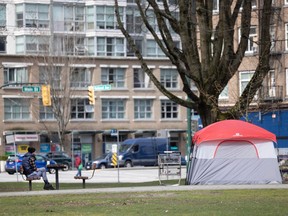Report seeks to designate areas and specific temporary structures for users, who have routinely clashed with officials

Article content
As Vancouver grapples with a rise in homelessness, the park board is proposing to crack down on which temporary shelters are allowed — and where — in its parks.
A report to go before the Vancouver Park Board Monday seeks clarification on bylaws to designate areas and specific temporary structures for users, who have routinely clashed with officials at CRAB Park.
Advertisement 2
Article content
Article content
But those advocating for unhoused residents say the news is just another upsetting blow.
Housing advocate Fiona York said Saturday she is angry the city is considering implementing legislative changes without consulting the population it stands to affect.
The new staff report recommends changing bylaws to allow only camping tents or collapsible canopies that are a maximum of 10 feet by 10 feet and “capable of being dismantled and moved by one person.” It would also prohibit construction materials such as lumber or fencing.
Current legislation defines a temporary shelter as one that can be dismantled and moved, and is occupied by a single person in a three-metre radius with at least one metre from other temporary shelters. It does not dictate what material are used for structures.
The amendments are intended to support use by those relying on parks for overnight shelter, set up better hygiene and safety outcomes, and improve relations between park users and operations staff.

Other bylaw amendments include banning the placement of temporary shelters under tree canopies or within seven metres of a lake, beach, dock, pond or cliff.
Article content
Advertisement 3
Article content
The report comes as an estimated 30 people are set to return to a designated area after crews completed a cleanup of the homeless camp late last month.
Crews cleared structures that were defined as “non-compliant,” many of which were made out of wood pallets or metal fencing.
Disputes have erupted between homeless residents and park rangers about which temporary shelters are permitted at the park.

During January’s cold weather, several homeless advocates visited the park with materials to construct small wooden dwellings to replace snow-battered tents. But they were met with police and park rangers, who claimed that building plans didn’t adhere to bylaws.
As of Saturday, York said a few residents had moved back to the designated daytime camping area of CRAB Park.
“They are being rushed to move,” York said, adding that only a few had done so because they are permitted to bring so little — only bedding and clothing.
York said that park rangers have given several residents tents in place of the makeshift homes they were living in before the encampment was bulldozed — but none have been permitted to bring their mattresses with them.
Advertisement 4
Article content
“The park board finally agreed to consider allowing cots, but now they need a city designer to sketch out such a regulation cot and what it can look like.”
A Metro Vancouver homeless count released last fall reported 4,821 people in the region without a home as of March 2023. Half of them were in Vancouver.
Recommended from Editorial
Bookmark our website and support our journalism: Don’t miss the news you need to know — add VancouverSun.com and TheProvince.com to your bookmarks and sign up for our newsletters here.
You can also support our journalism by becoming a digital subscriber: For just $14 a month, you can get unlimited access to The Vancouver Sun, The Province, National Post and 13 other Canadian news sites. Support us by subscribing today: The Vancouver Sun | The Province.
Article content





